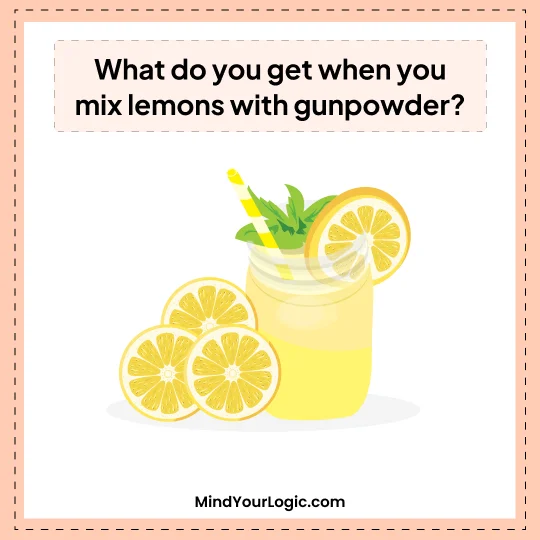Riddles have a unique way of tickling the brain and sparking curiosity. One such intriguing puzzle is, “What do you get when you mix lemon with gunpowder?” At first glance, the combination seems bizarre, leaving many scratching their heads in wonder.
Exploring the Lemon and Gunpowder Riddle
The riddle “What do you get when you mix lemon with gunpowder?” captivates many due to its unusual combination of elements. This section delves into the origin and popular interpretations of this intriguing puzzle.
The Origin of the Riddle
The exact origin of the lemon and gunpowder riddle remains unclear. However, it appears in various online forums, social media platforms, and puzzle books. These sources often share riddles that combine everyday items in unexpected ways to challenge conventional thinking. The blend of a common fruit like lemon with an explosive substance like gunpowder creates a vivid mental image, making it memorable.
Popular Interpretations
Several interpretations exist for this riddle:
- Explosive Lemonade: Some suggest that mixing lemon with gunpowder humorously results in “explosive lemonade.” This interpretation plays on the literal explosive nature of gunpowder combined with the refreshing aspect of lemonade.
- Metaphorical Insight: Others view it as a metaphor for combining two contrasting elements to create something surprising or impactful.
- Wordplay Answer: A common answer is “sherbet,” referencing a fizzy powdery treat that can be tangy like lemons and has an effervescent quality reminiscent of an explosion.
These interpretations highlight how riddles encourage creative thinking by blending disparate concepts into cohesive answers.
The Science Behind the Combination
Understanding the science behind mixing lemon with gunpowder reveals intriguing chemical and physical properties. This section explores these aspects to provide a clearer picture.
Chemical Properties of Lemon
Lemons contain citric acid, vitamin C, and various phytochemicals. Citric acid (C6H8O7) is a weak organic acid that gives lemons their sour taste. It has a pH level around 2-3, making it highly acidic. Vitamin C (ascorbic acid) acts as an antioxidant, while other compounds like flavonoids contribute to its health benefits.
Combustion Properties of Gunpowder
Gunpowder consists of potassium nitrate (saltpeter), charcoal, and sulfur in specific ratios: typically 75% potassium nitrate, 15% charcoal, and 10% sulfur. When ignited, these components undergo rapid oxidation-reduction reactions. Potassium nitrate supplies oxygen for combustion; charcoal serves as fuel; sulfur lowers the ignition temperature and increases the rate of combustion.
Combining lemon’s acidity with gunpowder’s combustibility doesn’t produce a significant chemical reaction under normal conditions due to their distinct properties.
Cultural Impact of the Riddle
The riddle “What do you get when you mix lemon with gunpowder?” has permeated various aspects of culture, influencing literature, media, education, and entertainment.
Usage in Literature and Media
Authors and screenwriters often use riddles to add depth to their narratives. The lemon-gunpowder riddle appears in mystery novels and TV shows where characters solve puzzles to advance the plot. For example, detective stories may feature this riddle as a clue that leads to a hidden message or secret location. In movies, it can serve as an icebreaker or tension reliever during intense scenes.
Educational and Entertainment Value
Educators use riddles like this one to stimulate critical thinking among students. By presenting seemingly unrelated items such as lemon and gunpowder, teachers encourage learners to think outside the box. This approach enhances problem-solving skills and creativity. Additionally, puzzle books for children and adults often include such riddles for their entertainment value, providing both fun and mental exercise.
The cultural impact of this riddle extends beyond mere curiosity; it enriches storytelling while fostering intellectual growth through playful challenges.
Analyzing Riddle Answers
Riddles often blend logic and humor, prompting diverse interpretations. The riddle “What do you get when you mix lemon with gunpowder?” is no exception.
Logical Analysis
Logical analysis of the riddle considers the properties of lemon and gunpowder. Lemons contain citric acid, which is acidic but not reactive enough to cause an explosion when mixed with gunpowder. Gunpowder consists of sulfur, charcoal, and potassium nitrate; these components require specific conditions to ignite. Since mixing lemon juice doesn’t provide such conditions, a literal explosive reaction isn’t feasible.
Humorous Takes
Humorous takes on the riddle highlight its playful nature. One popular answer is “explosive lemonade,” combining the idea of a refreshing drink with an unexpected twist. Another humorous interpretation is “sherbet,” referencing a fizzy candy that mimics an explosive sensation in the mouth without actual danger. These answers showcase how riddles use humor to engage and entertain audiences while encouraging creative thinking.
Conclusion
The riddle “What do you get when you mix lemon with gunpowder?” serves as a delightful mental exercise that blends logic and humor. By challenging conventional thinking, it encourages creative problem-solving and intellectual growth. Whether interpreted through scientific analysis or playful answers like “explosive lemonade,” this riddle enriches cultural narratives and educational practices alike. Its enduring appeal lies in its ability to stimulate the mind while offering a touch of whimsy, making it a valuable tool for both entertainment and learning.

